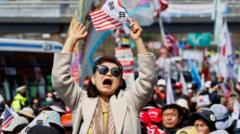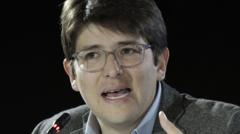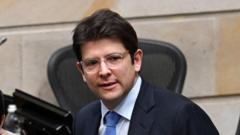The Constitutional Court of South Korea delivered a pivotal ruling, removing President Yoon Suk Yeol from office following his controversial attempt to impose martial law. The court's unanimous decision, reminiscent of the country's turbulent history, prompted a mixed emotional response in Seoul, with celebrations and tears from both supporters and critics alike. A snap election is mandated by June 3 to elect Yoon's successor, but the political rift within the nation is likely to persist.
**South Korea's Presidential Impeachment: An Uncertain Path Ahead**

**South Korea's Presidential Impeachment: An Uncertain Path Ahead**
South Koreans face a poignant moment in their democracy as Yoon Suk Yeol's impeachment reshapes the political landscape.
As South Korea grapples with the aftermath of Yoon’s brief military overreach, the societal impacts are profound. The events of December 3 during his military maneuver created lasting scars, bringing forth fears of an authoritarian resurgence. In recent weeks, demonstrations have proliferated as a growing portion of the populace expressed skepticism towards the judiciary and electoral processes. Amid calls for constitutional reform, Yoon’s conduct and political legacy remain polarizing.
Despite the court ruling viewed as a step toward preserving democratic principles, Yoon's claims of political conspiracies have germinated a faction of fervent supporters. Going forward, South Korea's urgency to establish a stable leadership is critical, especially as external pressures loom, including precarious trade relations and defense negotiations with a potentially hostile United States.
South Korea stands at a crossroads, needing unity and forward momentum after months of political turmoil, but facing uncertainty in its fractured political climate. Without a leader for months, the nation must rally to rebuild trust and navigate the complex web of regional tensions and domestic challenges that have arisen from this unprecedented political upheaval.
With calls for reconciliation and a brighter future, the upcoming weeks will be crucial as the nation readies itself for a new leadership election. How South Korea emerges from this crisis and fosters unity among its people will be a significant chapter in its ongoing democratic journey.
Despite the court ruling viewed as a step toward preserving democratic principles, Yoon's claims of political conspiracies have germinated a faction of fervent supporters. Going forward, South Korea's urgency to establish a stable leadership is critical, especially as external pressures loom, including precarious trade relations and defense negotiations with a potentially hostile United States.
South Korea stands at a crossroads, needing unity and forward momentum after months of political turmoil, but facing uncertainty in its fractured political climate. Without a leader for months, the nation must rally to rebuild trust and navigate the complex web of regional tensions and domestic challenges that have arisen from this unprecedented political upheaval.
With calls for reconciliation and a brighter future, the upcoming weeks will be crucial as the nation readies itself for a new leadership election. How South Korea emerges from this crisis and fosters unity among its people will be a significant chapter in its ongoing democratic journey.





















